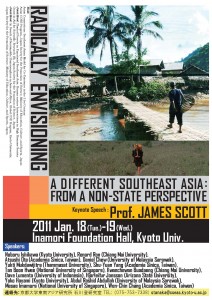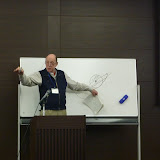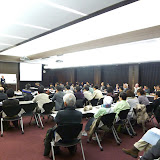International Seminar: “Radically Envisioning a Different Southeast Asia: From a Non-State Perspective”
January 18-19, 2011 at at CSEAS, Kyoto University

On January 18-19 2010, our Kiban (S) Project co-sponsored an international seminar entitled “Radically Envisioning a Different Southeast Asia: From a Non-State Perspective”. We welcomed Professor James Scott from Yale University and other renowned Southeast Asianists to the Center for Southeast Asian Studies, Kyoto University to participate in the two-day seminar.
The central question of this seminar was to ask to what extent Southeast Asia can be re-conceptualized, researched, and rewritten, if we considered non-state-centered perspectives and as such all participants joined in a discussion on these perspectives in the region and those of James Scott’s most recent work The Art of Not Being Governed (2010). A cursory glance at ethnographies concerning social formations in the region highlights how the nation-state-centered perspective has long generated a discussion on center-periphery dichotomies.

To engage in discussion on how the theoretical idea of Zomia (non-state periphery) plays out in Southeast Asia, the seminar explored different empirical case studies, with the aim of further refining and improving our understanding of Southeast Asian societies. The principle undertaking was to set out to correct the distortion imposed upon the past and present by re-reading the history of people without a history by critically examining state-centered historiography and ethnographic works on non-state space such as borderlands and maritime frontiers. It is in this context that James Scott, the keynote speaker presented his thoughts on how this re-reading can critically allow us to explore new avenues in relations between various actors and tease out the nuances that exist in state and non-state spaces.

The discussion of the seminar was closely related to the Kiban (S) project on riverine society where rivers function as a liaison between state space (downriver) and non-state space (upriver). The members of our Kiban (S) project also participated in the seminar and joined in the deliberative discussion.

(written by Noboru Ishikawa)
 On January 18-19 2010, our Kiban (S) Project co-sponsored an international seminar entitled “Radically Envisioning a Different Southeast Asia: From a Non-State Perspective”. We welcomed Professor James Scott from Yale University and other renowned Southeast Asianists to the Center for Southeast Asian Studies, Kyoto University to participate in the two-day seminar.
The central question of this seminar was to ask to what extent Southeast Asia can be re-conceptualized, researched, and rewritten, if we considered non-state-centered perspectives and as such all participants joined in a discussion on these perspectives in the region and those of James Scott’s most recent work The Art of Not Being Governed (2010). A cursory glance at ethnographies concerning social formations in the region highlights how the nation-state-centered perspective has long generated a discussion on center-periphery dichotomies.
On January 18-19 2010, our Kiban (S) Project co-sponsored an international seminar entitled “Radically Envisioning a Different Southeast Asia: From a Non-State Perspective”. We welcomed Professor James Scott from Yale University and other renowned Southeast Asianists to the Center for Southeast Asian Studies, Kyoto University to participate in the two-day seminar.
The central question of this seminar was to ask to what extent Southeast Asia can be re-conceptualized, researched, and rewritten, if we considered non-state-centered perspectives and as such all participants joined in a discussion on these perspectives in the region and those of James Scott’s most recent work The Art of Not Being Governed (2010). A cursory glance at ethnographies concerning social formations in the region highlights how the nation-state-centered perspective has long generated a discussion on center-periphery dichotomies.
 The discussion of the seminar was closely related to the Kiban (S) project on riverine society where rivers function as a liaison between state space (downriver) and non-state space (upriver). The members of our Kiban (S) project also participated in the seminar and joined in the deliberative discussion.
The discussion of the seminar was closely related to the Kiban (S) project on riverine society where rivers function as a liaison between state space (downriver) and non-state space (upriver). The members of our Kiban (S) project also participated in the seminar and joined in the deliberative discussion.
 (written by Noboru Ishikawa)
(written by Noboru Ishikawa) 
